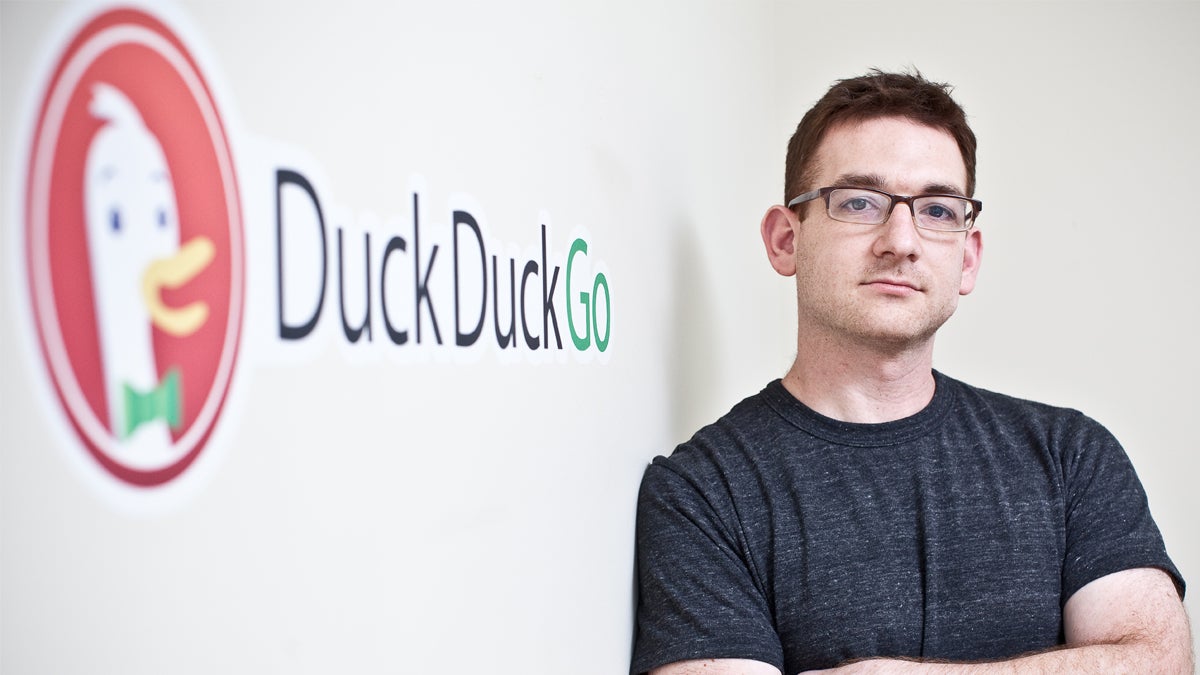Companies promising online privacy see post-PRISM bump

DuckDuckGo Founder Gabriel Weinberg says traffic to the search engine has grown since users began looking for ways to keep their online data private. (Photo courtesy of DuckDuckGo)
Earlier this month, Americans learned about widespread government surveillance of their online information.
The National Security Agency’s PRISM program grants the government wide access to personal information on the servers of Internet giants like Google and Facebook. In the last week, companies promising greater privacy online say they’ve seen their traffic skyrocket.
Mark Randall stood outside the bustling Apple store in Center City Philadelphia on Wednesday. Apple is among the companies the government has asked to hand over data. He is not super tech savvy but also uses other services on the list cooperating with the government: Google, YouTube.
“I’m on Dropbox with some items now and they’re set to join, correct?”
The answer is yes, according to The Washington Post.
Randall isn’t happy about the PRISM program. Still, he hasn’t tried to change his online routine.
“Had you grabbed me in the ‘60s, I’m sure I would have been much more activist,” he half-joked.
There are quite a lot of tools available to Randall and others who would prefer greater online privacy, from software that encrypts your web browsing, to others that block third party ad services from following you around the Internet.
Once news of the secret government program broke, many of those companies immediately saw their traffic start going up.
“That first week of after the story broke, every day broke our record,” said Gabriel Weinberg, who founded DuckDuckGo, an alternative search engine that does not keep its users’ search history.
“When you do a search on anything, your computer automatically sends information about itself. . . what we do is literally we just throw it out.“
DuckDuckGo, based in Paoli, Pa., looks like your classic tech start-up, with bright yellow beanbag chairs and an employee’s large dog lying under a desk. It has just 20 employees worldwide. But, as of Wednesday afternoon, traffic to the company’s site had grown more than 70 percent since June 6, when the story broke.
The weekly average grew by 63 percent.
“To put that in perspective,” Weinberg said, “It took us 435 days to get from one million to two million searches a day, and only eight days to go from two to three million.”
That’s still a small number, in relative terms. Google users log about a billion searches a day.
Weinberg can’t offer absolute privacy. It all depends on whether the sites you visit have secure – or encrypted – versions.
Non-encrypted sites would still show up in your Internet service provider’s records.
“That’s the thing about the way tech works,” pointed out Kashmir Hill, who covers online privacy for Forbes on her blog, The Not-so Private Parts. She spoke via Skype, which the government has also asked to supply user data. She says real privacy is doable, but complicated. “We’re often interacting with lots of different technology programs at once. . . this is where it’s not just one privacy tool that solves your problem. Usually you need to use a whole suite of tools.”
Because of that, Hill said she thinks the honeymoon period of growth for DuckDuckGo and others like it won’t last forever.
“I just don’t think that many people are going to adopt these tools unless it’s really easy.”
Outside the Philadelphia Apple store, Mark Randall agreed with her.
“I still can’t send an attachment,” Randall says. He he prefers to keep things simple – to log right onto his computer and know where he’s going. “Certain habits die hard and I am not born into the computer age. So when I get comfortable with something, change is really difficult.”
And it’s likely to stay that way, at least for now.
WHYY is your source for fact-based, in-depth journalism and information. As a nonprofit organization, we rely on financial support from readers like you. Please give today.




